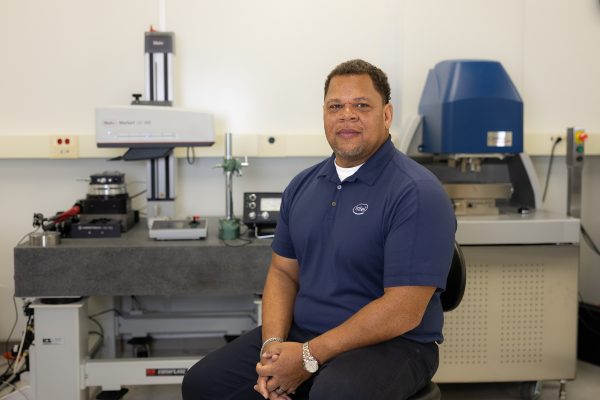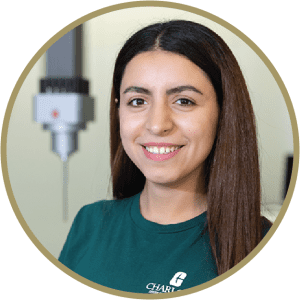Splitting Hairs: The Enormous Impact of Micro Measurement
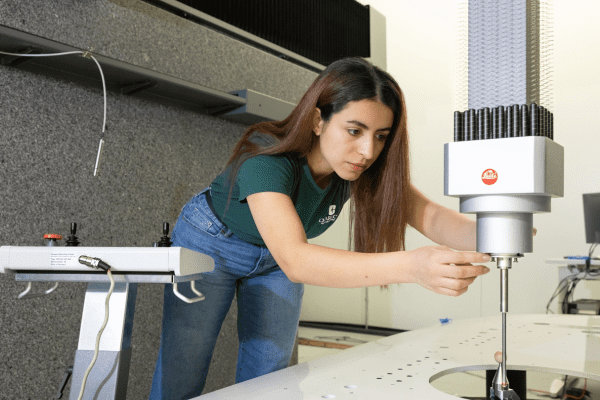
Look at one strand of your hair. Just one. Now, imagine the safety of your next airplane ride, the fuel efficiency of your car or the reliability of your cell phone were all dependent on something as small as 1/100th of the width of that strand of hair.
They are.
This tiny unit, the micron, and the study of measurements on this level, metrology, affect nearly every aspect of daily life.
For example, even minute deviations in the alignment of a car engine’s components can have significant effects on fuel efficiency.
For manufacturers in the western hemisphere, the Center for Precision Metrology at UNC Charlotte stands alone as the premier academic research center dedicated to delving into the impacts of these micro measurements.
ONLY AT CHARLOTTE: THE TOP ACADEMIC RESEARCH CENTER OF ITS KIND IN THE WESTERN HEMISPHERE.
“Being a part of CPM was life changing for me. It most definitely made a positive impact on my career path and success. I started my career working for the Navy as a civilian in NAVAIR’s Metrology and Calibration Program. Now, thirteen years later, I am the Deputy Chief Engineer of that program and still love what I do. I know that my work matters because it contributes to ensuring the safety of people.”

Tiffany Lemmons ’07, ’12 M.S. Electrical Engineering
Deputy Chief Engineer, Metrology and Calibration Program
NAVAIR Naval Air Systems Command

CPM encompasses state-of-the-art instruments, world-class research talent and industry partnerships to work on the scale of microns. For example, regarding mechanical components, dimensional differences of just microns will extend through huge assemblies – such as wind turbines and spacecraft – and will dictate the success or failure of the product.
Yet, the risks of imprecise measurement extend beyond operational inefficiency — aesthetics matter, too. Imagine a vehicle with mismatched panels, each exhibiting slightly different colors or textures.
When you think of John Deere, what comes to mind? Green. The precise green that appears on all of the company’s products is achieved through precision metrology, which ensures all its product panels, from hood to fender, are the same recognizable shade.
“If a manufacturer bought parts from different suppliers, all using different processes, and then put them all together, they might have surfaces that look different,” said graduate student Jesse Redford, who has a job lined up at the National Institute of Standards and Technology.
“My degree was pivotal in getting me to the next level in my career. I was able to go from an entry-level, metrology engineer to the Subject Matter Expert in precision metrology for the weapons production directorate. My education and experience at the CPM was the missing piece for me to accelerate. After completing studies at the CPM, I had a sense of ‘I can actually make a difference.’ ”

Mario Valdez ’15 Ph.D. Mechanical Engineering
R&D Engineer in Weapons Digital Engineering Strategy
Los Alamos National Labs
Metrologists help manufacturers avoid this scenario by using surface metrology, which is like a forensic tool for the manufacturing process. Through metrology, the smallest physical details of the item, including the microscopic peaks and valleys of the surface topography, are measured and quantified.
In this way, metrologists help ensure tactile and visual consistency, or in other words, the smoothness and final color of the painted panel. In the John Deere example, all panels now have the same aesthetics and polished feel, which reinforces customers’ perception of quality

Image: the result of a surface measurement of an item, showing the microscopic peaks and valleys that help metrologists quantify “roughness.”
DRIVING THE FUTURE OF MANUFACTURING
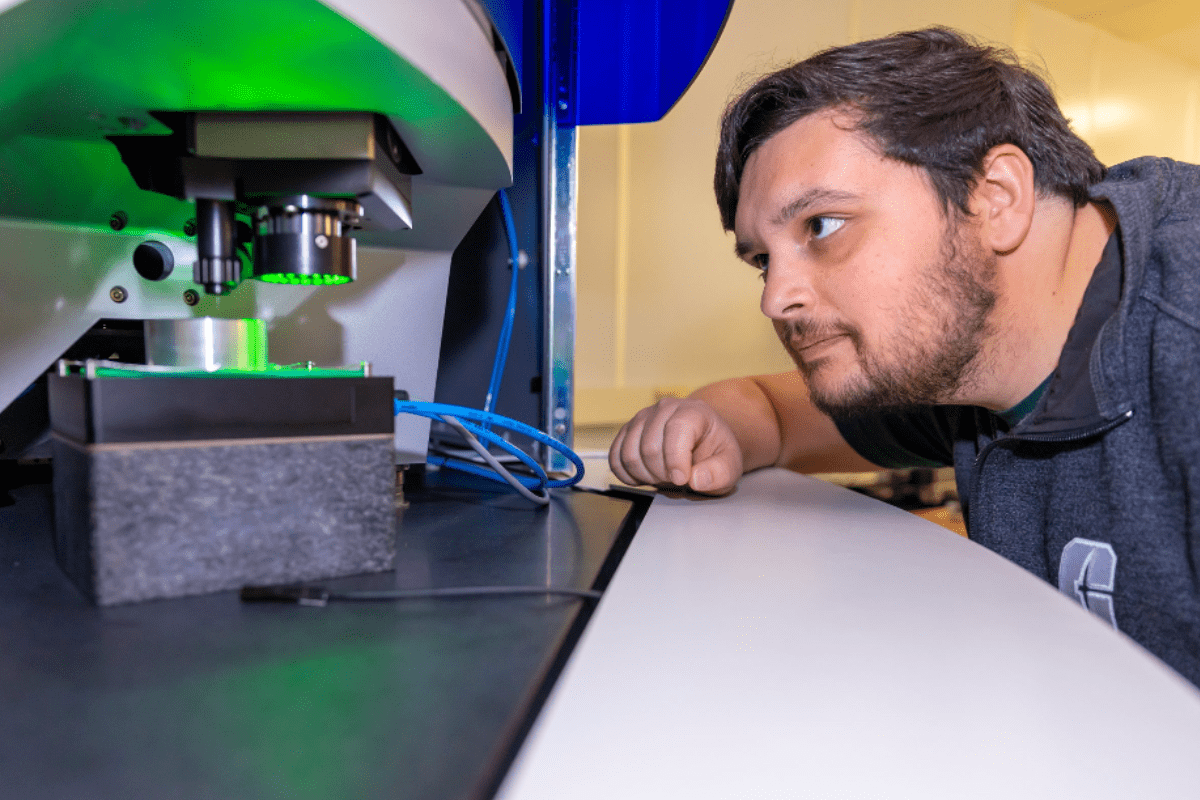
Charlotte offers a unique Ph.D. program with research dedicated to metrology — developing scientists and engineers with the training to ensure the safety and viability of future manufacturing.
The University’s robust research program draws faculty from the top of the field. Ed Morse, director of UNC Charlotte’s Center for Precision Metrology, chairs a national standards committee for the American Society of Mechanical Engineers. Many other CPM faculty serve in similar leadership roles that develop performance tests and standards, giving the manufacturing industry a shared model for requirements.
As Redford puts it, “The people who have done the fundamental research congregate here or pass through at one point in time or have an intimate connection to UNC Charlotte.”
Besides taking courses taught by world-class faculty, CPM graduate students regularly interact with members from industry. At semiannual CPM meetings, faculty and students present research to representatives from a dozen CPM affiliate companies (which support the center financially). In addition to figuring out how best to measure smoothness for John Deere, center researchers and students have created precision measurements for Boeing and developed more efficient equipment to increase quality measurements for Intel. Every student forms close relationships with these potential future employers.
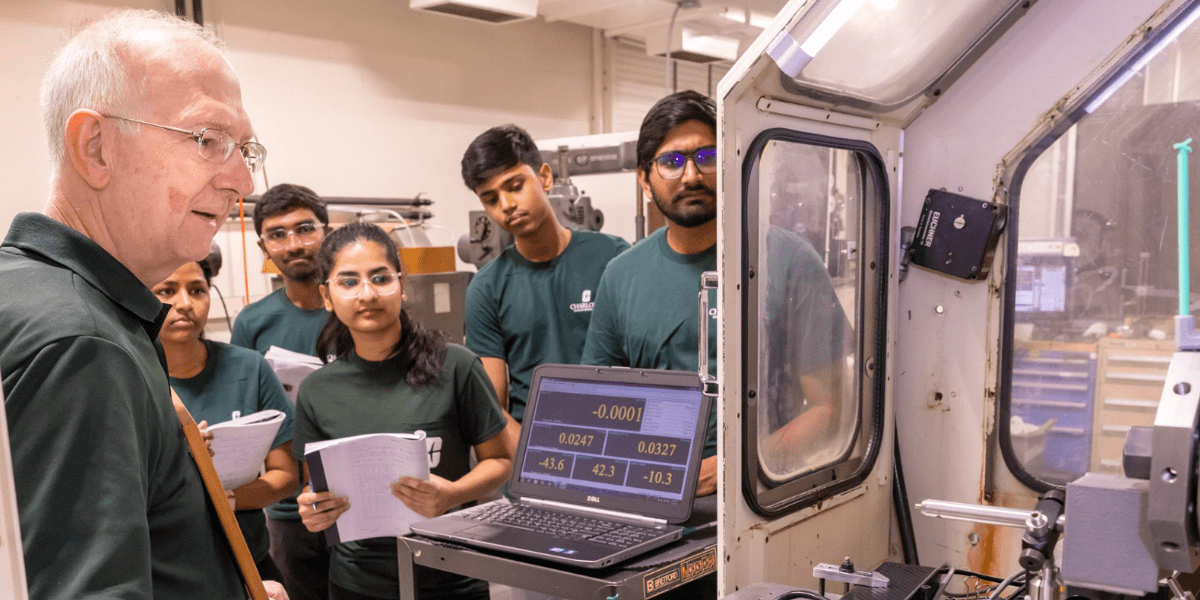
CPM Chief Engineer and Deputy Director Jimmie Miller teaches graduate mechanical engineering and metrology class
“Application of the theory is a differentiating aspect of the CPM. Those experiences in the lab are invaluable when solving real-world problems. They provide a fast filter that allows narrowing of the potential solution space to happen quickly.”
Osborne Martin ’99, ’03 Ph.D. Mechanical Engineering
Principal Engineer and Director
Intel
“From faculty and students to research and hands-on experience, CPM is different from any place I have worked before,” says graduate student Rehab Khattab, who joined the Ph.D. program after a stint at a biomechanics startup. “Not every professor works on the same research, but they know what I’m doing and give me advice. It’s a really good environment for work.”
After finishing the master’s or Ph.D. programs, Charlotte’s metrology graduates forge successful careers in academia, with manufacturing companies such as Caterpillar, Boeing, Cummins and Intel; and national labs like Lawrence Livermore, Los Alamos and Oak Ridge.











WANT TO KNOW MORE?
Ph.D. in Mechanical Engineering, focused in Precision Engineering and Manufacturing
Graduate Certificate in Precision Metrology
M.S. in Mechanical Engineering, focused in Manufacturing and Metrology
B.S. in Mechanical Engineering with concentration in Precision Engineering and Metrology
And in a couple short years, alumni of the new undergraduate concentration in metrology, housed within the mechanical engineering program, will follow the graduate students’ footsteps.
“We started the concentration based on feedback from industry partners. Many companies want to hire someone in metrology, but don’t necessarily need a scientist; they want an engineer who has been exposed to metrology and will have a head start at doing the work,” Morse said. “In the manufacturing arena, even if you’re not doing metrology every day, you really need to understand it.”
Ed Morse, CPM Director, guides undergraduate student using robotic arm for measurements.
To support this new concentration, in 2023 the Digital Metrology Standards Consortium established the Bailey H. Squier DMSC Metrology Memorial Scholarship for undergraduates at UNC Charlotte. This scholarship honors the legacy of Squier, a metrology industry leader who is well-known throughout standards organizations and had substantial influence over manufacturing and quality standards during his 40-year career. While Squier was neither a Niner alumnus nor faculty, UNC Charlotte was selected for the scholarship because of its reputation as a leader in metrology.
“They created a scholarship in his name at UNC Charlotte because we are known as the place that does metrology,” said Ed Morse, director of CPM.
MEET THE MASTER MEASURER
Morse’s Code on Metrology: The Essential Science Behind American Manufacturing
MEET THE STUDENTS
A Higher Degree of Distinction: Graduate Students Explain Their Passion For Precision
In 2023, CPM and the Center for Optoelectronics and Optical Communications were awarded a $500,000 planning grant from the U.S. Dept of Commerce’s Economic Development Administration. This investment is designed to drive regional innovation and job creation by strengthening capacities behind manufacturing technology that will advance American competitiveness.
“The results of this grant will determine the regional capacity for innovation and accelerate our ability to produce the next generation of advanced products and talent here in Charlotte,” said Vice Chancellor for Research John Daniels.
Request Information about the Ph.D. in Mechanical Engineering


